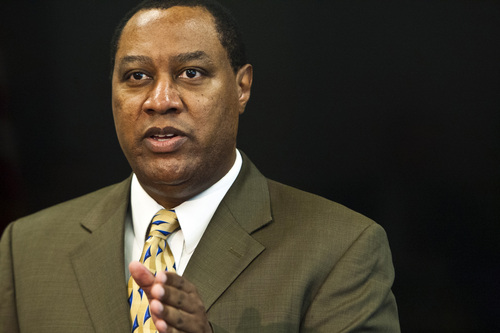This is an archived article that was published on sltrib.com in 2013, and information in the article may be outdated. It is provided only for personal research purposes and may not be reprinted.
The chairman of the Utah Republican Party said the party is "going to get run over" by the Count My Vote election reform initiative if its leaders continue to dig in their heels and refuse to adjust its nominating process.
"This is the hand you've given me, and I'll play it the best I can, and I'm very good at it … but I could have had a better hand," GOP Chairman James Evans told the party's governing board. "It does not work well for us to not even address the concerns that have been identified."
Evans' doom-and-gloom scenario came after the State Central Committee once again did not adopt another attempt to reform the caucus-convention system.
For months, proposals have come before the Central Committee that could have derailed or at least deterred the Count My Vote effort, but each time the committee rejected the reforms. Now the Count My Vote Group has decided to proceed with gathering signatures to put a measure on the ballot to replace the current caucus system with direct primaries.
"I don't have much to work with … other than trying to get the public to understand that [Count My Vote] is a worse alternative," Evans said. "To do that, we have to have a superior ground game, but we're up against some superior financing."
Republican National Committeeman Bruce Hough echoed Evans, saying the central committee has hurt its chances to beat back the Count My Vote effort.
"We have played directly into the hands of [Count My Vote]," said Hough. "We're not going to be told what to do, certainly by the elite. … Well, the consequences back at the last convention and even here today are we put our chairman in the boxing ring with one hand tied behind his back."
Telton Hall, a committee member from Cedar City, said Evans needs to remain positive and confident when he defends the caucus system.
"Please don't apologize," he said. "We haven't changed anything because it's working really, really well."
Under the Count My Vote proposal, a candidate who gathers enough signatures — 2 percent of the party's registered voters in the jurisdiction — would qualify for a party's primary ballot. The primary winner would be the party's nominee in the November election.
It would replace the current system where delegates chosen at neighborhood meetings meet at conventions and any candidate getting more than 60 percent of the delegates' support gets the party's nomination. Otherwise, the top two face a primary.
Count My Vote organizers contend the current system excludes those who can't attend the caucuses, gives too much power to a small group of delegates, drives down voter engagement and turnout and results in the election of officials who are outside the mainstream.
Evans counters that, under Count My Vote's proposal, a dozen people could be on a primary ballot, allowing a winner to advance with a small percentage of the vote. The parties would no longer have any say in who their nominees are and a Democrat could be chosen as the Republican nominee.
Special interests and corporations would have a greater say, Evans said, and the primaries would be subject to mischief from labor unions and others.
He said he can make a case that Count My Vote is a bad idea, but to win he needs his own party to show that it is serious about changing the system to encourage participation.
Count My Vote organizers have to gather signatures from 102,000 registered voters spread across 26 of 29 state senate districts to put the measure on the 2014 ballot. If it passes, the new primary system would take effect in the 2016 elections.
GOP Vice Chairman Willie Billings said if Count My Vote passes candidates will have no incentive to visit rural Utah and those counties will become "fly-over" country. He said keeping the Count My Vote organizers from getting enough signatures in rural Utah will be crucial.
"The way we win this thing is in rural Utah," Billings said. "I believe by playing offense right here, right now, up-front we can stop this thing."
On Saturday the central committee passed a resolution calling on the party and the Legislature to defend the caucus system.
But it put off a vote on a measure that would have required candidates to get two-thirds support from delegates if attendance at caucuses drops below 15 percent of party membership.
When the committee meets again in December, other proposals aimed at increasing caucus attendance are expected, as well.
In the meantime, Count My Vote advocates will be gathering signatures to put their proposal on the ballot.
gehrke@sltribcom
Twitter: @RobertGehrke



